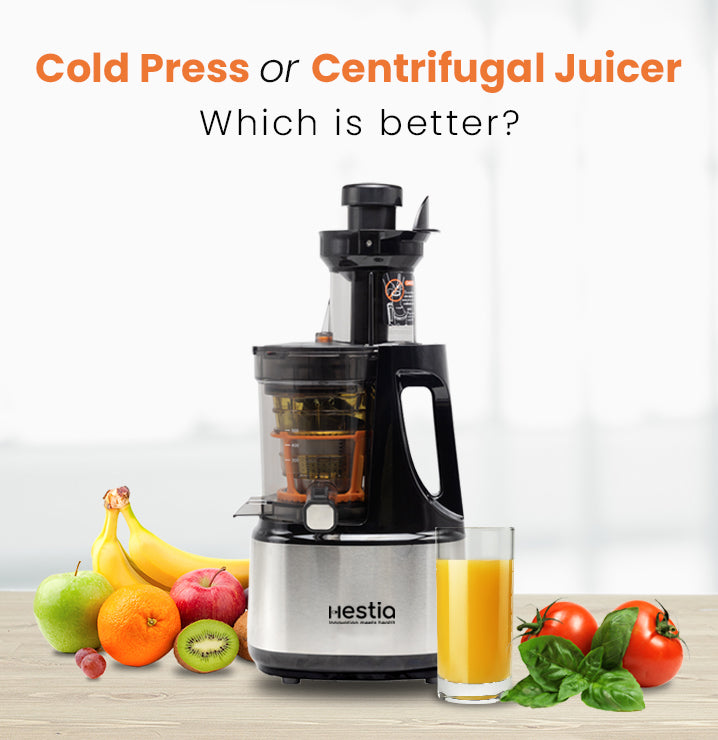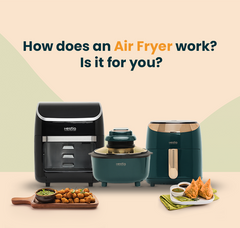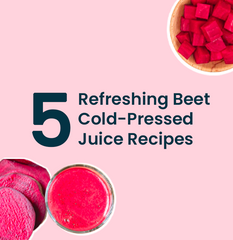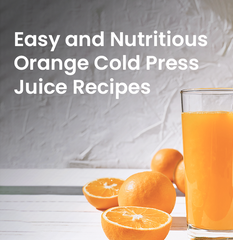Cold Press Juicer VS Centrifugal Juicer | Key Differences
Jul 01, 2022 - Fareed Ahmad
There are two types of juicers available in the market today- centrifugal or normal juicers, and cold-pressed juicers. A high-quality juicer gives you the option of healthy, nutritionally dense juices in the comfort of your home.
A healthy food routine has always been central to our lives. The pandemic has only served to highlight the importance of eating mindfully. Consuming fruits and vegetables that are in season have been shown to have a positive effect on immunity. Incorporating different fruits and vegetables into your diet has been made easier with kitchen appliances like juicers.
What is a Cold Press Juicer
A cold press juicer, also known as a masticating juicer, uses a hydraulic press to crush the fruits and vegetables extracting juice from them. Additionally, no heat is generated in the extraction process and hence the name, cold press juicer.
With several micronutrients heat sensitive, this helps in retaining the nutrients present in the fresh produce making it flavourful and healthy.
Cold press juicer vs centrifugal juicer
Centrifugal juicers have been around for ages. Chances are we have all seen and used them. With cold press juicers growing increasingly popular, let’s take a look at the differences between the two.
A centrifugal juicer uses rapidly rotating, sharp blades to finely chop the fruits and vegetables. Centrifugal juicers primarily work by deploying a disc-shaped grater or a cutting disc. This works by tearing and shredding the fruits and vegetables, releasing the juice stored within them. The released juice is then pulled by centrifugal force to the edge of the disc, enveloped by a fine mesh wrap. The centrifugal force then separates the juice from the pulp. However, a centrifugal juicer generates a high amount of heat.
A cold press juicer, on the other hand, uses a slow auger to crush and press the fruits and vegetables. By working at a very low rpm cold press juicers eliminate heat generation.
What health benefits does a cold-pressed juicer offer?
Given that we just discussed how cold press juicers work, let us understand the many benefits they offer.
Cold press juices retain higher amounts of vitamins and minerals. Further, a cold press juicer helps extract higher volumes of juice. Additionally, cold press juicers enable the preservation of enzymes that naturally occur in the produce, increasing the nutrient content. This makes the juice richer, more flavourful, and ultimately more tasty!
Lastly, a cold pressed juice does not break down quickly or separate into layers as is the case in juices made using a centrifugal juicer.
What are the pros and cons of a cold press juicer?
Let’s break down the pros and cons of a cold press juicer.
The Pros:
- No heat generation, therefore no oxidation of the juice
- Higher amounts of micronutrients and enzymes retained
- Extracts a higher amount of juice from fruits and vegetables
- Ideal for leafy vegetables and pulpy fruits
- Higher shelf life
- Operates silently without excessive noise generation
The Cons:
- Slightly longer time to extract juice from fruits and vegetables
- Weighs a bit more than a centrifugal juicer
- Costs slightly more than a centrifugal juicer
- Generates a higher amount of pulp so if you are someone who prefers less pulp this may pose a problem.
Comparing the two, cold press juicers are the better choice for you if you have the time each day and are looking to get more out of your juices. Cold pressed juicers are also great if you like to add green leafy produce.
What is centrifugal Juicer ?
A centrifugal juicer is the most common juicer used to extract juices from fruits and vegetables. A centrifugal juicer uses fast-spinning metal blades to shear your produce. The pulp and juice are separated through the centrifugal force generated. An inner mesh then separates the pulp and the juice into two different containers.
What are the pros and cons of a centrifugal juicer?
Comparing centrifugal juicers and cold press juicers, here are the pros and cons.
The Pros:
- Lightweight
- More efficient, faster, and saves time
- More economical than a cold press juicer
- Easy to handle
- Low pulp
- Beginner-friendly, especially for people looking to include more juices in their diet
The Cons:
- High heat generation
- Reduced nutrient retention
- Elevated oxidation of juices leads to faster separation of layers
- Generates very low volume of juices from leafy vegetables
- High amount of waste generated in processing certain fruits and vegetables
- Shelf-life of juice is lower when compared to cold pressed juices
- Higher level of noise generation
Comparing both centrifugal juicers and cold press juicers tells us that if the time and cost are constraints, a centrifugal juicer can be a good starting point.
Which juicer is the best long-term investment for you?
Cold press juicer vs centrifugal juicer - which one is the best choice? Well, it depends on various factors such as the intended use, budget, your preference of produce, and how long you want to store the juice for. However, a cold press juicer is a better long term investment option when taking a close look at the benefits it offers.
While a cold press juicer is slightly more expensive as compared to a centrifugal juicer, the health benefits far outweigh the initial cost concerns. The juices produced with Cold pressed juicer are also richer in vitamins and minerals.
Buying a cold press juicer is a long term investment that would go a long way in helping you incorporate more seasonal fruits and vegetables into your diet easily.
What about nutrient value?
When we compare cold press juicers vs normal juicers, an important aspect is the increased nutrient retention. One of the reasons for including juices in your daily routine is to hit your micronutrient targets and in some cases, overcoming deficiencies, if any.
Most of the nutrients present in produce are highly heat sensitive. This means they are rapidly destroyed when the ambient temperature is elevated over the optimal range.
This is the case with centrifugal juicers and the heat generated destroys the nutrients and natural enzymes contained in the produce. Switching to cold press juicers will allow you to retain the essential nutrients and increase the shelf life. Additionally, with a higher pulp content, there is more fibre which aids digestion.
What is the best juicer for home use?
If you are someone who is hard pressed for time and are looking for a speedy juicer at a lower cost, a centrifugal juicer would be your best bet.
However, if you are looking to include juices for health reasons, a centrifugal juicer would not be a suitable choice owing to its lesser nutrition retention. Further, if you intend to include a great deal of leafy vegetables, a centrifugal juicer would be problematic as it leads to higher wastage, especially in these scenarios.
A cold press juicer, while slightly more expensive, would be an ideal choice for you if you are looking to buy a juicer for dietary and lifestyle reasons.

 Get extra 5% Off by using code HESTIA5
. on your order
Get extra 5% Off by using code HESTIA5
. on your order
 No Cost EMI : Avail No Cost EMI with Razorpay for orders above ₹2990.
No Cost EMI : Avail No Cost EMI with Razorpay for orders above ₹2990.






